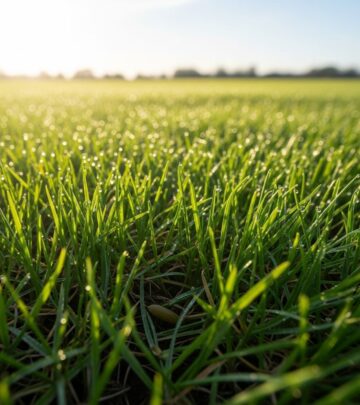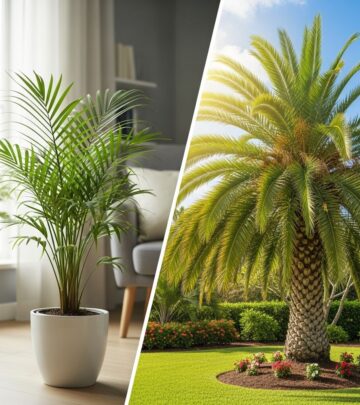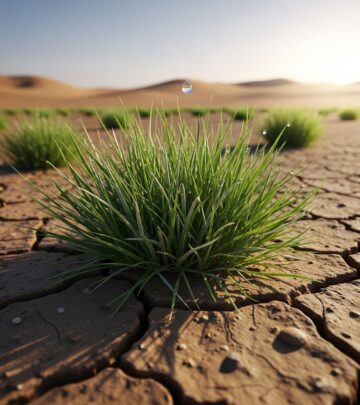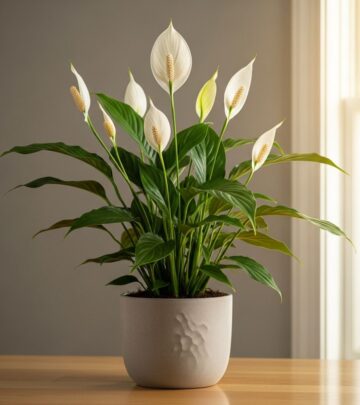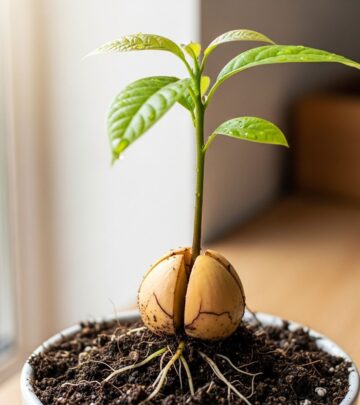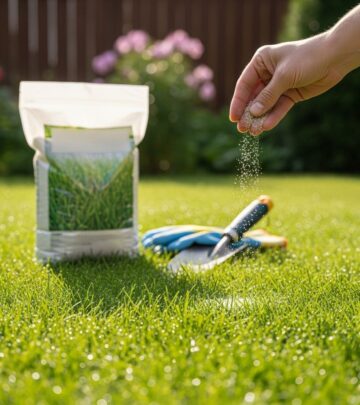How To Get Jade Plants To Bloom Indoors: A Step-By-Step Guide
Seasonal shifts and rest periods set the stage for star-shaped flowers by winter.
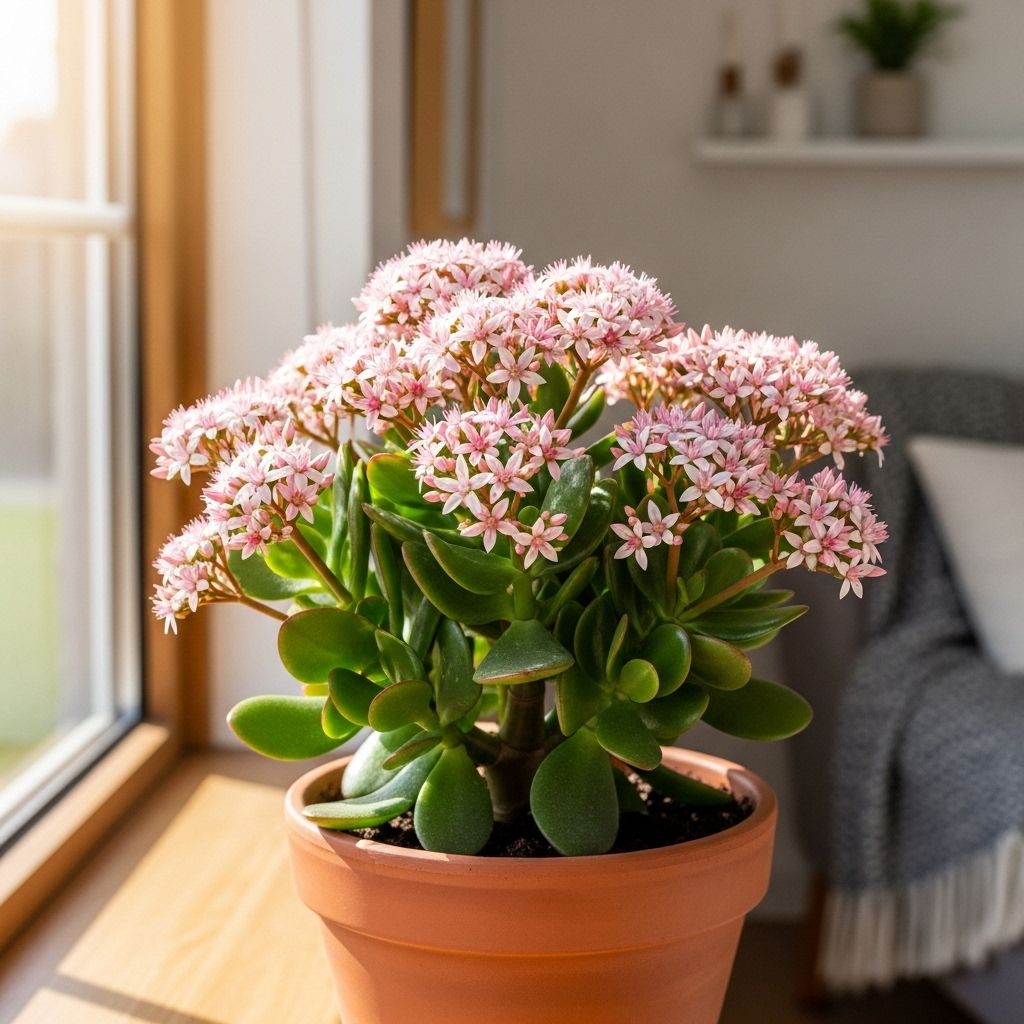
How to Get Jade Plants to Bloom Indoors
Jade plants (Crassula ovata) are adored for their plump, glossy leaves and easy-care reputation, but many indoor gardeners dream of coaxing out their clusters of delicate star-shaped flowers. Achieving jade blooms indoors isn’t impossible—it requires understanding the plant’s natural cues, habitat, and a patient, methodical approach to its care. This guide details what triggers blooming in jade plants, practical steps to encourage flowers, and troubleshooting strategies—all based on expert horticultural advice and real-world experience.
Table of Contents
- Understanding the Jade Plant’s Blooming Cycle
- Key Indoor Growing Requirements for Flowering
- Essential Jade Plant Care for Blooming Indoors
- Advanced Tips: Pushing Jade Plants to Bloom
- Common Blooming Problems & Solutions
- Aftercare: What to Do After Your Jade Plant Blooms
- Frequently Asked Questions
Understanding the Jade Plant’s Blooming Cycle
The jade plant’s lush leaves make it a houseplant staple, but its flowering process is often elusive indoors. In its native habitats and mature state, the jade naturally produces clusters of tiny white or pink star-shaped flowers—typically in winter or early spring.
- Blooming is infrequent indoors—often only after several years of age and optimal conditions.
- In nature, blooms coincide with cool, dry seasons and longer nights—mirroring winter dormancy cues.
- Flowering is triggered by a combination of cool night temperatures, shortened daylight, reduced watering, and a brief rest period.
- Mature, well-established plants are more likely to bloom than young ones.
The blooms appear in clusters at the ends of the stems, have a faint sweet scent, and draw pollinators in outdoor settings, though pollination isn’t necessary for bloom indoors.
Blooming Facts Table
| Factor | Description |
|---|---|
| Average Plant Age to Bloom | 3 to 5+ years (maturity required) |
| Blooming Season | Late winter to early spring |
| Flower Color | White or pink star-shaped |
| Bloom Duration | 2–6 weeks, depending on conditions |
| Key Triggers | Cool nights, reduced watering, short days, mature plant |
Key Indoor Growing Requirements for Flowering
Recreating the jade plant’s natural triggers indoors is essential for blooming. This means adjusting light exposure, temperature, and watering routine as the seasons change.
Essential Blooming Triggers
- Light: At least 4–6 hours of direct sunlight daily during spring and summer; short days (no artificial light at night) in autumn and winter help trigger buds.
- Cooler Nighttime Temperatures: Maintain 50–60°F (10–16°C) at night during fall and early winter to simulate dormancy.
- Reduced Watering: Water sparingly in fall and early winter to encourage a dormant rest period. Pot and soil should dry out between waterings.
- Withholding Fertilizer: Avoid feeding in the late fall and winter, as excess nutrients can inhibit bud formation.
- No Nighttime Light Pollution: Place plants in a room that goes fully dark at night to allow the plant to sense shorter days—critical for flower initiation.
Essential Jade Plant Care for Blooming Indoors
While jade plants are generally low-maintenance, successfully inducing blooms requires attention to specific care routines throughout the year.
Lighting Requirements
- Place the plant near a south- or west-facing window, where it gets bright light for at least four hours daily.
- Insufficient light leads to leggy growth and rare blooms—use a supplemental grow light if your home lacks direct sunlight.
- Rotate the plant periodically to promote even growth and exposure.
Watering Guidelines
- Spring/Summer: Water deeply only when the top inch of soil is dry. Never let the pot sit in standing water.
- Fall/Winter: Significantly reduce watering frequency, letting soil dry out between sessions.
- Overwatering can cause root rot and will inhibit blooming; underwater rather than overwater.
Soil and Potting
- Use a well-draining succulent or cactus soil mix. A blend of coarse sand, perlite, and light organic matter works well.
- Terracotta or clay pots are preferred for their breathability, helping excess moisture evaporate quickly.
- Repot every 3 years with fresh soil, but only after the plant has finished blooming.
- Jade plants prefer being slightly root-bound and do not require frequent upsizing.
Temperature and Humidity
- Ideal daytime range: 65–75°F (18–24°C).
- Nighttime should drop to 50–60°F (10–16°C) in fall and winter for best flowering odds.
- Humidity: Jade plants are tolerant of average indoor humidity but dislike damp or overly humid corners.
Fertilization
- Feed with a dilute, balanced liquid fertilizer (10-10-10 or similar) monthly during the growing season (spring to late summer).
- Do not fertilize in fall and winter, as this can inhibit the rest period necessary for budding.
Advanced Tips: Pushing Jade Plants to Bloom
Many growers find patience is key, but a few advanced techniques can increase success rates for indoor jade flowers:
- Induce Dormancy: In early autumn, withhold water and cease all feeding. Allow the plant to experience nights around 55°F (13°C), and ensure absolute darkness for at least 13–14 hours per night.
- Gradual Acclimatization: In summer, move the plant outdoors (if possible) to a sheltered location with indirect sunlight to strengthen the plant, but bring it indoors before first frost.
- Controlled Stress: Mimic natural drought and cooler temperatures, then resume normal watering in late winter as buds swell.
- Use of Grow Lights: For windowless rooms, full-spectrum LED grow lights set to mimic natural daylight hours can help substitute sunlight—though true darkness at night is still crucial.
- Plant Maturity: Older, established plants that have formed woody stems are far more likely to flower compared to young cuttings.
Be aware that forcing blooms should always be gradual; abrupt changes in water, light, or temperature can cause leaf drop or stress the plant.
Common Blooming Problems & Solutions
Even with proper care, jade plants sometimes refuse to flower indoors. Here’s how to troubleshoot the most common issues:
- No Blooms After 4+ Years: Likely due to insufficient rest (dormant) period, not enough direct light, or too much nighttime light. Increase duration of darkness and reduce nighttime temperatures in fall.
- Soft, Droopy Leaves: Overwatering or poor drainage; adjust watering habits and ensure well-draining soil.
- Leggy, Tall Growth: Not enough sunlight. Move to a brighter window or provide supplemental lighting.
- Leaves Wrinkling and Dropping: Underwatering or major temperature fluctuations. Establish a regular, careful watering routine appropriate to the season.
- No Flower Buds, Only Leaves: Excess nitrogen fertilizer; withhold all feeding during the late fall/winter rest period.
- Sudden Leaf Loss After Moving Location: Stress from abrupt changes; slowly acclimate before seasonal moves or light changes.
Aftercare: What to Do After Your Jade Plant Blooms
Once a jade plant has finished blooming indoors, follow these care steps to maintain its health and ensure future flowers:
- Remove spent flower stalks as they fade by trimming close to the stem. Don’t pull—use clean, sharp scissors.
- Begin gradually increasing water and fertilizer as spring arrives to support new leaf growth.
- Check roots for any sign of rot and consider repotting (with fresh soil) after blooms drop, if needed.
- Resume regular care for succulents during spring and summer. Expect several years between each major bloom cycle.
Best Practices Table: Post-Bloom Jade Care
| Task | Purpose |
|---|---|
| Prune spent blooms | Prevents disease, tidies plant |
| Gradually resume watering/fertilizer | Encourages healthy regrowth |
| Check root system | Detect issues after possible winter rot |
| Repot if necessary | Refresh soil, prevent crowding |
Frequently Asked Questions (FAQs)
Q: Why won’t my jade plant bloom indoors?
A: The most common reasons are not enough direct sunlight, lack of a cool/dark rest period in fall/winter, and too much fertilizer during dormancy.
Q: How old does a jade plant need to be to flower?
A: Jade plants generally need to be several years old and well established (3–5 years or more) before blooming is possible.
Q: Can I force a jade plant to bloom every year?
A: Even when giving ideal care, jade plants rarely flower annually; blooms are sporadic and may skip years depending on environmental cues and plant health.
Q: Is there a specific fertilizer to help jade plants bloom?
A: Use a balanced, dilute fertilizer during the growing season, but withhold all fertilizer in fall/winter. Excess nutrients at this time can inhibit flowering.
Q: Can I keep my jade plant outdoors to help it bloom?
A: Absolutely! Mature jade plants benefit from time outdoors in bright but sheltered light during summer. Bring indoors before frost and transition them carefully.
Q: How long do jade plant flowers last?
A: Jade blooms typically last 2–6 weeks, depending on plant health and environmental conditions.
Q: Can all types of jade plant bloom indoors?
A: Most Crassula ovata varieties can flower given proper care, but some hybrids are less likely. Mature, standard green-leaf jades tend to bloom most reliably.
Summary: Achieving Indoor Jade Plant Blooms
Inspiring your jade plant to flower inside is a testament to faithful, consistent care and an understanding of its natural needs. By providing adequate light, a restful dormant season with cool nighttime temperatures, and judicious watering and feeding, most healthy, mature jades will eventually reward you with their intricate, seasonal blooms. Patience and keen observation remain your best gardening tools—happy growing!
References
- https://www.gardeningknowhow.com/houseplants/jade-plant/getting-a-jade-plant-to-bloom.htm
- https://hort.extension.wisc.edu/articles/jade-plant-crassula-ovata/
- https://planetdesert.com/blogs/news/jade-plants-types-care-growing-guide
- https://intuitiveplants.org/blogs/houseplant-care-best-practices/mastering-jade-plant-care-your-complete-handbook-%F0%9F%93%97
- https://www.youtube.com/watch?v=jEi6v-Jd7FU
Read full bio of Srija Burman

